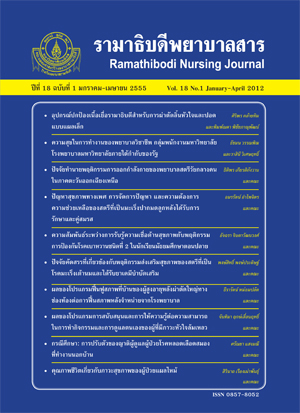ปัจจัยคัดสรรที่เกี่ยวข้องกับพฤติกรรมส่งเสริมสุขภาพของสตรีที่เป็นโรคมะเร็งเต้านมและได้รับยาเคมีบำบัดเสริม
Main Article Content
Abstract
บทคัดย่อ
การศึกษาครั้งนี้เป็นการวิจัยเชิงบรรยายเพื่อศึกษาความสัมพันธ์ระหว่างความเครียด การรับรู้สมรรถนะของตนเอง การรับรู้อุปสรรค การรับรู้ประโยชน์ การสนับสนุนทางสังคม และ พฤติกรรมส่งเสริมสุขภาพของสตรีที่เป็นมะเร็งเต้านมและได้รับยาเคมีบำบัดเสริมภายใต้กรอบแนวคิด ทฤษฎีรูปแบบการส่งเสริมสุขภาพของเพนเดอร์ การเลือกกลุ่มตัวอย่างเป็นแบบเฉพาะเจาะจง กลุ่มตัวอย่างคือ สตรีที่เป็นมะเร็งเต้านมหลังได้รับยาเคมีบำบัดครบที่มารับบริการที่คลินิกโรค เต้านมและต่อมไร้ท่อ โรงพยาบาลรามาธิบดี จำนวน 100 ราย เก็บรวบรวมข้อมูลระหว่างเดือน พฤษภาคม 2553 ถึงเดือนสิงหาคม 2553 โดยใช้แบบสอบถาม วิเคราะห์ข้อมูลด้วยวิธีการทาง สถิติโดยใช้ค่าร้อยละ ค่าเฉลี่ย ส่วนเบี่ยงเบนมาตรฐาน ค่าสหสัมพันธ์ของเพียร์สัน และค่าสหสัมพันธ์ของสเปียร์แมน ผลการวิจัยพบว่า การรับรู้สมรรถนะของตนเอง การรับรู้ประโยชน์ และการสนับสนุนทางสังคมมีความสัมพันธ์เชิงบวกกับพฤติกรรมส่งเสริมสุขภาพอย่างมีนัยสำคัญทางสถิติ และ ความเครียดมีความสัมพันธ์เชิงลบกับพฤติกรรมส่งเสริมสุขภาพอย่างมีนัยสำคัญทางสถิติ ส่วนการรับรู้อุปสรรคไม่มีความสัมพันธ์กับพฤติกรรมส่งเสริมสุขภาพอย่างมีนัยสำคัญทางสถิติ ผลการวิจัยครั้งนี้แสดงให้เห็นถึงปัจจัยที่มีความสัมพันธ์กับพฤติกรรมส่งเสริมสุขภาพของสตรีที่เป็นมะเร็งเต้านม และได้รับยาเคมีบำบัดเสริมในเชิงสนับสนุนและขัดขวางการมีพฤติกรรมส่งเสริมสุขภาพ ดังนั้น พยาบาลควรจัดโปรแกรมการดูแลและส่งเสริมสุขภาพให้สอดคล้องกับปัจจัยที่เกี่ยวข้องและ ประสบการณ์การส่งเสริมพฤติกรรมสุขภาพของสตรีที่เป็นมะเร็งเต้านมแต่ละรายเพื่อคงไว้ ซึ่งการมีคุณภาพชีวิตที่ดีต่อไป
คำสำคัญ: พฤติกรรมส่งเสริมสุขภาพ สตรีที่เป็นมะเร็งเต้านม การรับรู้สมรรถนะของตนเอง การรับรู้ประโยชน์ การสนับสนุนทางสังคม
Abstract
The purpose of this descriptive research was to investigate the relationships among stress, perceived self-efficacy, perceived barriers to action, perceived benefits of action, social support, and health-promoting behavior of women with breast cancer who had undergone adjuvant chemotherapy. Pender’s Health Promotion Model was used to guide this study. The study utilized a purposive sample of 100 women with breast cancer who completed adjuvant chemotherapy from the Outpatient Breast and Endocrine Clinic of Ramathibodi Hospital. All data were collected using the questionnaires between May 2010 to August 2010. The data were analyzed using percentage, means, standard deviations, Pearson’s product moment correlation, and Spearman rank correlation. The results revealed that there were positive significant correlations of perceived self-efficacy, perceived benefits of action, and social support, to health-promoting behavior ; and there was negative significant correlation between stress and health-promoting behavior. There was no statistically significant correlation between perceived barriers to action and health-promoting behavior. The findings show selected factors, which are positively and negatively related to health-promoting behaviors in women with breast cancer undergone adjuvant chemotherapy. Therefore, it is important for nurses to provide nursing care and health promotion programs based on related factors and on the experience of the health behaviors among those women in order to maintain their health-promoting behaviors.
Keywords: Health-promoting behavior, Women with breast cancer, Self-efficacy, Perceived benefits of action, Social support
Article Details
บทความ ข้อมูล เนื้อหา รูปภาพ ฯลฯ ที่ได้รับการตีพิมพ์ในรามาธิบดีพยาบาลสาร ถือเป็นลิขสิทธิ์ของวารสาร หากบุคคลหรือหน่วยงานใดต้องการนำทั้งหมดหรือส่วนหนึ่งส่วนใดไปเผยแพร่หรือเพื่อกระทำการใด ใด จะต้องได้รับอนุญาตเป็นลายลักษณ์อักษรจากรามาธิบดีพยาบาลสารก่อนเท่านั้น


